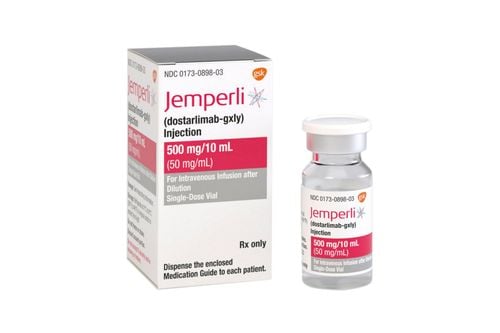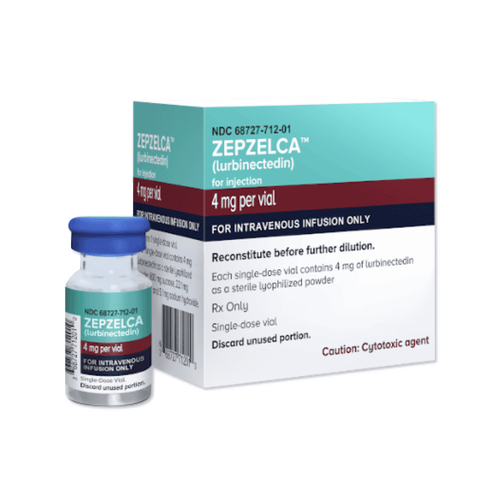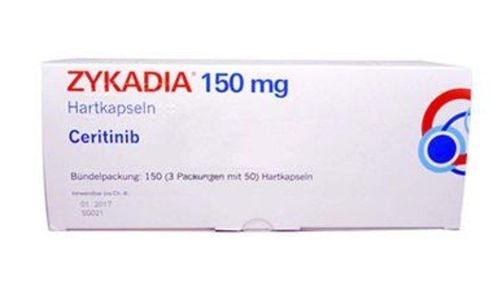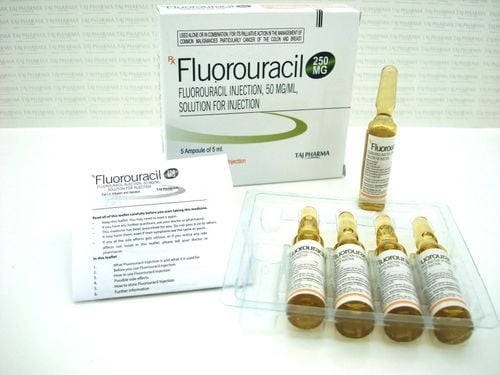This is an automatically translated article.
Everolimus is a drug used in the treatment of cancer. This article will explain more about the effects, uses and interactions of Everolimus, through which readers can get more useful information about this drug.
1. What does Everolimus do?
Everolimus has the trade name Afinitor® by the pharmaceutical company Novartis. Everolimus is a type of targeted therapy. This means it works by targeting a specific part of the cancer cells, thereby reducing the side effects caused by unwanted damage to healthy cells.
The drug can also disrupt angiogenesis, the growth of blood vessels to provide nutrients to tumors for them to grow.
Everolimus is used in the treatment of neuroendocrine tumors of gastrointestinal or pulmonary origin that are inoperable, locally advanced, or metastatic. In addition, the drug has also been approved to treat pancreatic neuroendocrine tumors, breast cancer, and kidney cancer.
The drug is prepared in the form of tablets of 2.5 mg, 5 mg and 10 mg.
2. Usage and dosage of Everolimus
2.1. How to take Everolimus is taken orally, in the form of tablets. The patient should swallow the tablets whole with a glass of water, which can be taken before/during/after meals. Do not break, crush or chew the tablet. To avoid missed doses, take Everolimus at the same time each day.
2.2 Dosage The dose of medicine will be prescribed by the doctor based on the size and type of cancer, health condition, response to treatment, test results of the patient, and other medications they are taking. It is important to make sure that you are taking the correct amount of medicine prescribed by your doctor each time. Dosage for some specific subjects is as follows:
Usual adult dose for breast cancer, renal cell carcinoma, pancreatic cancer, renal angiomyolipoma, neuroendocrine cancer: Oral 10mg x 1 time/day. Duration of treatment: continue until the disease progresses or the body can no longer accept the toxicity of the drug. The usual dose for adults with brain tumors/intracranial tumors is: 4.5mg/m2, once a day. Duration of treatment: use until the disease progresses or the body can no longer accept the toxicity of the drug. The optimal duration of treatment is not specific. The oral dose for adults used to prevent the body from rejecting an organ transplant is usually: For kidney transplants: 0.75mg, taken twice a day. The dose for children with brain tumor/intracranial tumor is usually: Children from 1 year old: orally 4.5mg/m2, 1 time/day. Duration of treatment, continue until the disease progresses or the body can no longer accept the toxicity of the drug. The optimal duration of treatment is not specific. Note that patients should not increase the dose on their own, use this drug more often or longer than indicated. The patient's condition will not improve faster, but instead the risk of side effects from the drug will increase. If the patient has any questions during the use of the drug, ask the doctor or pharmacist immediately.
If you miss a dose and are less than 6 hours away from your usual dose, take it as soon as you remember. If it has been more than 6 hours, skip the dose. Do not use a double dose to make up for a missed dose of Everolimus.
The patient's caregiver should not have direct hand-to-hand contact with the medication while preparing the dose for the patient. Wash your hands thoroughly before and after taking medicine for the sick person.
3. Possible Side Effects of Everolimus
Mouth ulcers (Mucositis / Stomatitis) Infection and low white blood cell count (leukopenia or neutropenia) Anemia / low red blood cell count. Low platelet count, which increases the risk of bleeding. Nail and skin changes: This medicine may affect the patient's nails and skin. The patient may develop a rash. The rash may be red, rough, dry, and feel painful. The skin can be very dry, darken, crack, itch, or become flaky or scaly. Inflammation of the skin around the nail beds/cuticles of the toes or fingers, known as paronychia. It may be red, swollen, or filled with pus. Fingernails may grow "ridges" or fall off, and there are cuts or cracks that look like small paper cuts in the skin of the toes, fingers, or knuckles.
4. Everolimus can interact with which drugs, which foods?
Everolimus blood levels can be affected by certain foods and medications, so they should be avoided. Everolimus may change the way some other medicines you are taking or increase the effects of side effects.
To avoid drug interactions, it is best for patients to make a list of all medications they are taking (including prescription, nonprescription, herbal and dietary supplements) and show it to their doctor or pharmacist. view and advise.
To ensure safety when using Everolimus, patients should not self-medicate, stop or change the dosage of the drug without consulting a doctor.
Drugs that interact with Everolimus when used together:
Medicines that weaken the immune system / increase the risk of infection (eg rituximab, natalizumab), ACE inhibitors (eg captopril, lisinopril). Other drugs may affect how Everolimus is removed from the body, which may affect how well Everolimus works. Examples include azole antifungals (such as itraconazole, ketoconazole, fluconazole, voriconazole ), cobicistat, macrolide antibiotics (such as erythromycin, clarithromycin), HIV and HCV protease inhibitors (such as boceprevir, atazanavir, telaprevir, ritonavir), rifamycins (such as rifabutin, rifampin), Wort St. John's wort, telithromycin, Verapamil, phenytoin and diltiazem, carbamazepine, phenobarbital, and others. Live vaccines: Patients or anyone living with them should avoid using live or live attenuated vaccines while being treated with Everolimus. These include herpes zoster (Zostavax) to prevent shingles, oral polio, measles, nasal flu vaccine (FluMist®), rotovirus vaccine, and yellow fever. How does Everolimus interact with food or drink?
Food, alcohol, tobacco... can interact with certain drugs, patients need to consult their doctor or pharmacist before using them during treatment with Everolimus Grapefruit. Since grapefruit juice, grapefruit juice, and other foods known to inhibit CYP450 and PgP activity may increase Everolimus exposure, grapefruit should be avoided during treatment with this medicine.
5. Storage and handling
Store Everolimus at room temperature in a dry place and protected from light. Keep the medicine in the original packaging. You should not use the medication container for this medication. Keep out of reach of children and pets. Unused drugs should be consulted with the supplier for proper disposal. Do not flush down the toilet or throw in the trash. Note: Pregnant or nursing women should not be exposed to the drug.
Please dial HOTLINE for more information or register for an appointment HERE. Download MyVinmec app to make appointments faster and to manage your bookings easily.













